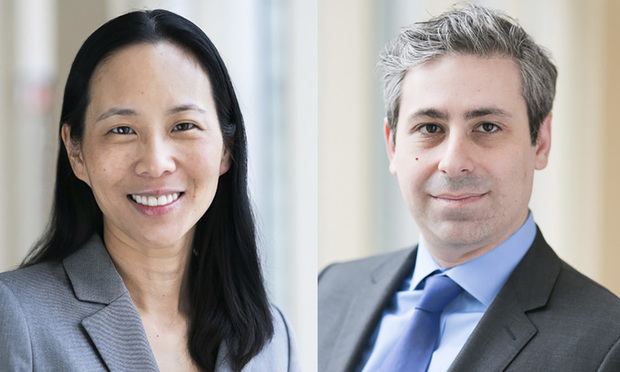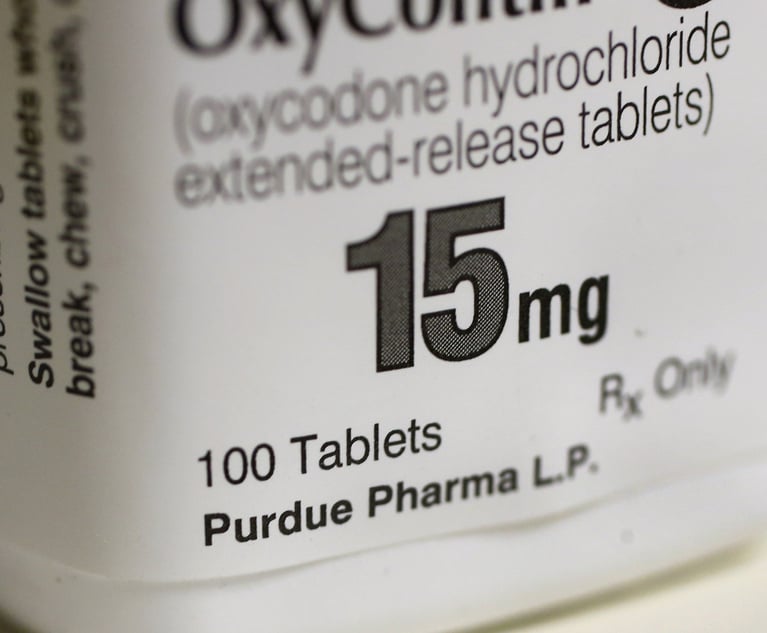Latham Strikes Again on Branded Pharma by Adding 2 Hogan Lovells Litigators
The firm adds Hogan Lovells Arlene Chow and Ernest Yakob in New York five months after landing the co-chair of Williams & Connolly's patent group. All represent innovators in the pharmaceutical and biologic drug space.
June 16, 2020 at 02:14 PM
5 minute read
 Latham & Watkins partners Arlene Chow, left, and Ernest Yakob, right.
Latham & Watkins partners Arlene Chow, left, and Ernest Yakob, right.Arlene Chow and Ernest Yakob have been neighbors on and off for 17 years.
The two have practiced life-science based intellectual property litigation from adjacent offices in the New York branch of Hogan Lovells since the early 2000s. Yakob left for awhile to get a doctorate in microbiology and immunology from the Albert Einstein College of Medicine in the Bronx.
Since his return, the two have joined forces regularly on behalf of clients such as Takeda Pharmaceutical Co. Ltd., Depomed Inc. and, most recently, BASF Plant Science LP in a jury trial against Australia's national research lab.
Now the two are on a journey together to a new law firm. They joined Latham & Watkins as partners Tuesday. They are effusive in their praise for Hogan. But Chow, 48, says Latham represents "a fantastic opportunity" at a firm that "prides itself on taking its cases to trial."
Yakob, 45, says "the opportunity to learn from so many talented people will be just great for our practice and for me personally."
Chow and Yakob represent the next steps in Latham's drive to build out IP litigation capability for pharmaceutical and biologics innovators. Five months ago the firm landed Williams & Connolly partner Adam Perlman, whose clients include Eli Lilly & Co.
Michael Morin, global vice chair of Latham's IP practice, described Chow as "a triple threat"—equally capable of taking a first chair role in a jury trial, arguing appeals to the Federal Circuit, and litigating before the Patent Trial and Appeal Board. Yakob, meanwhile, serves as a technical strategist, working closely with experts, in-house counsel and in-house scientists.
"We're trying to establish the No. 1 branded pharma practice, and between Adam and now Arlene and Ernest, that takes us a long way there," Morin said.
An added bonus is the duo's location in New York City, an area of focus for the firm and the IP group. The firm's global chair of IP, David Callahan, said the firm would have taken a talent like Chow regardless of location. But "I think if she said wherever you want me to be, I think we would have said New York."
Callahan and Morin said the coronavirus pandemic posed less of a challenge to recruiting than one might expect. Chow was "a very high person on our list for a long time," Morin said, and she had the opportunity for some face-to-face partner meetings before shelter-in-place orders swept the country. Chow said she also got a good sense of other partners' personalities via web conferences. "I think everyone's gotten comfortable and conversant with the technology," she said.
Certainly, Yakob has had to. Last month he presented argument on post-trial motions in BASF v. Commonwealth Scientific and Industrial Research Organization via Zoom conference in the Eastern District of Virginia.
Chow, Yakob and their Hogan colleagues originally faced 17 patents and 350 claims related to canola plants that have been engineered to produce omega-3 fatty acids. Jurors were told the market for plant-based omega-3s has been estimated at $1 billion a year.
"We just chipped away at a lot of those claims" in the two years before trial, Chow said. Even then, "it was really a challenge to simplify the case for the jury." In addition to attacking the validity of CSIRO's patents, "the story became one of 'We shared our knowledge with you, and we should thus share in the patents.'"
Ultimately, BASF and its licensing partner Cargill Corp. defeated claims from 13 of the patents whose terms extended as far as 2034. For the four remaining patents with terms expiring in 2025, Hogan's team defeated an injunction and defined a favorable royalty, the firm said.
As for arguing the JMOL motions by Zoom conference, it was "a little surreal," Yakob said. But it's "one I'll be able to tell my kids about."
Chow and Yakob are both graduates of Columbia Law School. Chow has a bachelor's in molecular biophysics and biochemistry from Yale, while Yakob has a bachelor's in chemical engineering from Columbia and a master's in recombinant DNA technology from NYU to go with his PhDs from the Albert Einstein College.
"We couldn't be more pleased to have Arlene and Ernest join the firm," said Michèle Penzer, Latham's New York managing partner, in a written statement. "They add further depth and muscle to our IP litigation practice in New York by combining first-rate courtroom skills and advanced scientific training that will help drive results."
This content has been archived. It is available through our partners, LexisNexis® and Bloomberg Law.
To view this content, please continue to their sites.
Not a Lexis Subscriber?
Subscribe Now
Not a Bloomberg Law Subscriber?
Subscribe Now
NOT FOR REPRINT
© 2025 ALM Global, LLC, All Rights Reserved. Request academic re-use from www.copyright.com. All other uses, submit a request to [email protected]. For more information visit Asset & Logo Licensing.
You Might Like
View All

NY Ready to Reopen Claim Against Purdue Pharma, If 60-Day Negotiating Window Closes Without Accord


Ready to Meet the Moment: Data Privacy and Cybersecurity Concerns Echo Throughout Biotech and Synthetic Biology
10 minute readLaw Firms Mentioned
Trending Stories
Who Got The Work
J. Brugh Lower of Gibbons has entered an appearance for industrial equipment supplier Devco Corporation in a pending trademark infringement lawsuit. The suit, accusing the defendant of selling knock-off Graco products, was filed Dec. 18 in New Jersey District Court by Rivkin Radler on behalf of Graco Inc. and Graco Minnesota. The case, assigned to U.S. District Judge Zahid N. Quraishi, is 3:24-cv-11294, Graco Inc. et al v. Devco Corporation.
Who Got The Work
Rebecca Maller-Stein and Kent A. Yalowitz of Arnold & Porter Kaye Scholer have entered their appearances for Hanaco Venture Capital and its executives, Lior Prosor and David Frankel, in a pending securities lawsuit. The action, filed on Dec. 24 in New York Southern District Court by Zell, Aron & Co. on behalf of Goldeneye Advisors, accuses the defendants of negligently and fraudulently managing the plaintiff's $1 million investment. The case, assigned to U.S. District Judge Vernon S. Broderick, is 1:24-cv-09918, Goldeneye Advisors, LLC v. Hanaco Venture Capital, Ltd. et al.
Who Got The Work
Attorneys from A&O Shearman has stepped in as defense counsel for Toronto-Dominion Bank and other defendants in a pending securities class action. The suit, filed Dec. 11 in New York Southern District Court by Bleichmar Fonti & Auld, accuses the defendants of concealing the bank's 'pervasive' deficiencies in regards to its compliance with the Bank Secrecy Act and the quality of its anti-money laundering controls. The case, assigned to U.S. District Judge Arun Subramanian, is 1:24-cv-09445, Gonzalez v. The Toronto-Dominion Bank et al.
Who Got The Work
Crown Castle International, a Pennsylvania company providing shared communications infrastructure, has turned to Luke D. Wolf of Gordon Rees Scully Mansukhani to fend off a pending breach-of-contract lawsuit. The court action, filed Nov. 25 in Michigan Eastern District Court by Hooper Hathaway PC on behalf of The Town Residences LLC, accuses Crown Castle of failing to transfer approximately $30,000 in utility payments from T-Mobile in breach of a roof-top lease and assignment agreement. The case, assigned to U.S. District Judge Susan K. Declercq, is 2:24-cv-13131, The Town Residences LLC v. T-Mobile US, Inc. et al.
Who Got The Work
Wilfred P. Coronato and Daniel M. Schwartz of McCarter & English have stepped in as defense counsel to Electrolux Home Products Inc. in a pending product liability lawsuit. The court action, filed Nov. 26 in New York Eastern District Court by Poulos Lopiccolo PC and Nagel Rice LLP on behalf of David Stern, alleges that the defendant's refrigerators’ drawers and shelving repeatedly break and fall apart within months after purchase. The case, assigned to U.S. District Judge Joan M. Azrack, is 2:24-cv-08204, Stern v. Electrolux Home Products, Inc.
Featured Firms
Law Offices of Gary Martin Hays & Associates, P.C.
(470) 294-1674
Law Offices of Mark E. Salomone
(857) 444-6468
Smith & Hassler
(713) 739-1250






